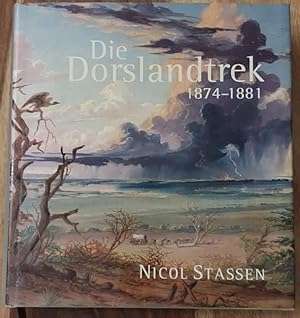
Die Dorslandtrek, 1874-1881
Check my rate
| Main centres: | 1-3 business days |
| Regional areas: | 3-4 business days |
| Remote areas: | 3-5 business days |

| Main centres: | 1-3 business days |
| Regional areas: | 3-4 business days |
| Remote areas: | 3-5 business days |
Published by Protea Boekhuis, 2015,hardcover, Afrikaans text, illustrated, 711 pages, index, 36 cms x 27.2 cms x 5.2 cms, condition: new.
Dorsland Trek (Thirstland Trek) is the collective name of a series of explorations undertaken by Boer settlers from South Africa from 1874 to 1881, in search of political independence and better living conditions. The participants, Trekboers ("migrating farmers"; the singular is trekboer from the Orange Free State and Transvaal, are called Dorslandtrekkers. After the Great Trek a community arose that comprised a few Voortrekkers spread in different groups across a large geographical area in the Transvaal. However, there was no unity amongst them as there was no leader who could unite the different groups. Serious political and church disputes at some stage even led to a civil war. After the Great Trek had initially impoverished the community, their geographic isolation resulted in further economic and intellectual isolation. Despite the lack of wealth or education, the average Transvaal Boer felt very independent. This easily escalated into stubbornness and the reluctance or inability to accept the authority of others. During the Great Trek and settlement afterwards, their education was completely neglected. As a result, the Transvaal Boers on the eve of the Thirstland Trek were a severely divided society, especially in terms of religion. They were therefore at a disadvantage in almost all aspects when compared to their peers in the rest of South Africa.
There was probably not one single reason for this, but rather a combination of reasons why a small group of aggrieved Boers decided to leave the Transvaal. The primary reasons for the Thirstland Trek were religious ones and expostulation against President Thomas Burgers progressive policy, specifically his new education legislation, the unpleasant circumstances in the Gereformeerde Kerk (Reformed Church) and the search for a New Jerusalem. Consequently, it was mainly the members of the Gereformeerde Kerk who participated in the Thirstland Trek. Political and economic reasons such as the fear of being regarded as equal to black people, uncertain political conditions, the fear of humanisation (in terms of opposition to new ideas), lack of land and population pressure, poverty and a fear of paying more tax could have played an additional, less important, role. It is clear that the so-called trek spirit played no role whatsoever during the trek. Opposition to British imperial expansion probably also did not play any significant part in the minds of most trekkers who left before April 1877. By far the majority of the Transvaal population and almost all the members of the other church denominations were not as unhappy as their compatriots with the circumstances and chose to remain in the Transvaal.
At spiritual level there were huge differences among the Thirstland Trekkers, who had a more conservative character, and their fellow citizens in the Transvaal. In a few instances the mental state of the Jerusalemgangers (a group of Voortrekkers in the Transvaal who wanted to trek overland to Jerusalem in Palestine) affected the Trekkers. Their conservative outlook on life also affected their level of education detrimentally. Almost all the people who met the Thirstland Trekkers commented on their low level of education. The mak volk was a group of labourers who accompanied the Thirstland Trekkers and adapted the way of life and spiritual culture of the Trekkers. Despite the fact that an estimated 130200 mak volk participated in the Thirstland Trek, they were mainly an invisible part of the Trek. Often their contribution to the Trek is ignored. In many reminiscences, narratives and statistics about the trek they are not even mentioned. They were descendants of the indigenous people of South Africa of which most of them were taken as children on the battlefield and were then raised by the trekkers. As a result of their shared experiences during the trek, a very close relationship arose between them and the white Thirstland trekkers.